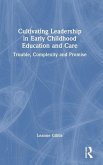Vygotsky's Theory in Early Childhood Education and Research
Russian and Western Values
Herausgeber: Veraksa, Nikolay; Sheridan, Sonja
Vygotsky's Theory in Early Childhood Education and Research
Russian and Western Values
Herausgeber: Veraksa, Nikolay; Sheridan, Sonja
- Gebundenes Buch
- Merkliste
- Auf die Merkliste
- Bewerten Bewerten
- Teilen
- Produkt teilen
- Produkterinnerung
- Produkterinnerung
Drawing on in-depth analyses of Lev Vygotsky's theories of early childhood, and investiging the ways in which his ideas are reflected in contemporary educational settings, this book highlights the numerous opportunities for learning and development afforded by Vygotskian approaches.
Andere Kunden interessierten sich auch für
![Challenging the School Readiness Agenda in Early Childhood Education Challenging the School Readiness Agenda in Early Childhood Education]() Miriam B TagerChallenging the School Readiness Agenda in Early Childhood Education198,99 €
Miriam B TagerChallenging the School Readiness Agenda in Early Childhood Education198,99 €![The Importance of Play in Early Childhood Education The Importance of Play in Early Childhood Education]() The Importance of Play in Early Childhood Education186,99 €
The Importance of Play in Early Childhood Education186,99 €![Cultural Diversity and Inclusion in Early Years Education Cultural Diversity and Inclusion in Early Years Education]() Penny BorkettCultural Diversity and Inclusion in Early Years Education200,99 €
Penny BorkettCultural Diversity and Inclusion in Early Years Education200,99 €![Encounters with Materials in Early Childhood Education Encounters with Materials in Early Childhood Education]() Veronica Pacini-KetchabawEncounters with Materials in Early Childhood Education198,99 €
Veronica Pacini-KetchabawEncounters with Materials in Early Childhood Education198,99 €![Cultivating Leadership in Early Childhood Education and Care Cultivating Leadership in Early Childhood Education and Care]() Leanne GibbsCultivating Leadership in Early Childhood Education and Care197,99 €
Leanne GibbsCultivating Leadership in Early Childhood Education and Care197,99 €![Values in Early Childhood Education Values in Early Childhood Education]() Values in Early Childhood Education197,99 €
Values in Early Childhood Education197,99 €![Vygotsky's Educational Theory in Cultural Context Vygotsky's Educational Theory in Cultural Context]() Alex Kozulin / Boris Gindis / Vladimir S. Ageyev / Suzanne M. Miller (eds.)Vygotsky's Educational Theory in Cultural Context57,99 €
Alex Kozulin / Boris Gindis / Vladimir S. Ageyev / Suzanne M. Miller (eds.)Vygotsky's Educational Theory in Cultural Context57,99 €-
-
-
Drawing on in-depth analyses of Lev Vygotsky's theories of early childhood, and investiging the ways in which his ideas are reflected in contemporary educational settings, this book highlights the numerous opportunities for learning and development afforded by Vygotskian approaches.
Hinweis: Dieser Artikel kann nur an eine deutsche Lieferadresse ausgeliefert werden.
Hinweis: Dieser Artikel kann nur an eine deutsche Lieferadresse ausgeliefert werden.
Produktdetails
- Produktdetails
- Verlag: Taylor & Francis Ltd (Sales)
- Seitenzahl: 220
- Erscheinungstermin: 6. März 2018
- Englisch
- Abmessung: 234mm x 156mm x 14mm
- Gewicht: 503g
- ISBN-13: 9781138299047
- ISBN-10: 1138299049
- Artikelnr.: 57053111
- Herstellerkennzeichnung
- Libri GmbH
- Europaallee 1
- 36244 Bad Hersfeld
- gpsr@libri.de
- Verlag: Taylor & Francis Ltd (Sales)
- Seitenzahl: 220
- Erscheinungstermin: 6. März 2018
- Englisch
- Abmessung: 234mm x 156mm x 14mm
- Gewicht: 503g
- ISBN-13: 9781138299047
- ISBN-10: 1138299049
- Artikelnr.: 57053111
- Herstellerkennzeichnung
- Libri GmbH
- Europaallee 1
- 36244 Bad Hersfeld
- gpsr@libri.de
Nikolay Veraksa is Leading Scientific Researcher at the Russian Academy of Education, Professor of Moscow State Pedagogical University and Leading Scientific Researcher at Moscow City University, Russia. Sonja Sheridan is Professor of Education at the Department of Education, Communication and Learning, University of Gothenburg, Sweden.
Foreword Part I: An introduction to Vygotsky's legacy Chapter 1: Overview
of the book and a statement of its aims and objectives Chapter 2: Vygotsky
in two perspectives: Russian and Western understandings Part II: Children's
cognitive learning and development Chapter 3: Dialectical thinking research
in early years Chapter 4: Narratives as tools for expressing structure and
creativity with preschool children in two cultures Chapter 5: Executive
functions development in early years Chapter 6: Theory of other's minds,
children's dialectical thinking and abilities to reflect and communicate on
new opportunities Chapter 7: Vygotsky in Harlem: Amplification of
preschoolers' development in Vygotskian Early Childhood Education Program
(VECEP) Chapter 8: Vygotsky's conception of preschool development: play
with orientation and narration Part III: Interaction and communication
Chapter 9: The interaction between parents with their preschool children
during leisure time: key features Chapter 10: Preschool children's
collaboration and learning together Chapter 11: Early literacy in preschool
Part IV: Play and physical activities Chapter 12: Technological modern toys
in the early child development Chapter 13: Learning through digital play in
the Australian context of early childhood education and care Chapter 14:
The Vygotskian approach in physical education for early years Part V: An
environment for learning and development Chapter 15: Preschool quality and
conditions for children's learning in preschool in Russia and Sweden
Conclusion
of the book and a statement of its aims and objectives Chapter 2: Vygotsky
in two perspectives: Russian and Western understandings Part II: Children's
cognitive learning and development Chapter 3: Dialectical thinking research
in early years Chapter 4: Narratives as tools for expressing structure and
creativity with preschool children in two cultures Chapter 5: Executive
functions development in early years Chapter 6: Theory of other's minds,
children's dialectical thinking and abilities to reflect and communicate on
new opportunities Chapter 7: Vygotsky in Harlem: Amplification of
preschoolers' development in Vygotskian Early Childhood Education Program
(VECEP) Chapter 8: Vygotsky's conception of preschool development: play
with orientation and narration Part III: Interaction and communication
Chapter 9: The interaction between parents with their preschool children
during leisure time: key features Chapter 10: Preschool children's
collaboration and learning together Chapter 11: Early literacy in preschool
Part IV: Play and physical activities Chapter 12: Technological modern toys
in the early child development Chapter 13: Learning through digital play in
the Australian context of early childhood education and care Chapter 14:
The Vygotskian approach in physical education for early years Part V: An
environment for learning and development Chapter 15: Preschool quality and
conditions for children's learning in preschool in Russia and Sweden
Conclusion
Foreword Part I: An introduction to Vygotsky's legacy Chapter 1: Overview
of the book and a statement of its aims and objectives Chapter 2: Vygotsky
in two perspectives: Russian and Western understandings Part II: Children's
cognitive learning and development Chapter 3: Dialectical thinking research
in early years Chapter 4: Narratives as tools for expressing structure and
creativity with preschool children in two cultures Chapter 5: Executive
functions development in early years Chapter 6: Theory of other's minds,
children's dialectical thinking and abilities to reflect and communicate on
new opportunities Chapter 7: Vygotsky in Harlem: Amplification of
preschoolers' development in Vygotskian Early Childhood Education Program
(VECEP) Chapter 8: Vygotsky's conception of preschool development: play
with orientation and narration Part III: Interaction and communication
Chapter 9: The interaction between parents with their preschool children
during leisure time: key features Chapter 10: Preschool children's
collaboration and learning together Chapter 11: Early literacy in preschool
Part IV: Play and physical activities Chapter 12: Technological modern toys
in the early child development Chapter 13: Learning through digital play in
the Australian context of early childhood education and care Chapter 14:
The Vygotskian approach in physical education for early years Part V: An
environment for learning and development Chapter 15: Preschool quality and
conditions for children's learning in preschool in Russia and Sweden
Conclusion
of the book and a statement of its aims and objectives Chapter 2: Vygotsky
in two perspectives: Russian and Western understandings Part II: Children's
cognitive learning and development Chapter 3: Dialectical thinking research
in early years Chapter 4: Narratives as tools for expressing structure and
creativity with preschool children in two cultures Chapter 5: Executive
functions development in early years Chapter 6: Theory of other's minds,
children's dialectical thinking and abilities to reflect and communicate on
new opportunities Chapter 7: Vygotsky in Harlem: Amplification of
preschoolers' development in Vygotskian Early Childhood Education Program
(VECEP) Chapter 8: Vygotsky's conception of preschool development: play
with orientation and narration Part III: Interaction and communication
Chapter 9: The interaction between parents with their preschool children
during leisure time: key features Chapter 10: Preschool children's
collaboration and learning together Chapter 11: Early literacy in preschool
Part IV: Play and physical activities Chapter 12: Technological modern toys
in the early child development Chapter 13: Learning through digital play in
the Australian context of early childhood education and care Chapter 14:
The Vygotskian approach in physical education for early years Part V: An
environment for learning and development Chapter 15: Preschool quality and
conditions for children's learning in preschool in Russia and Sweden
Conclusion








